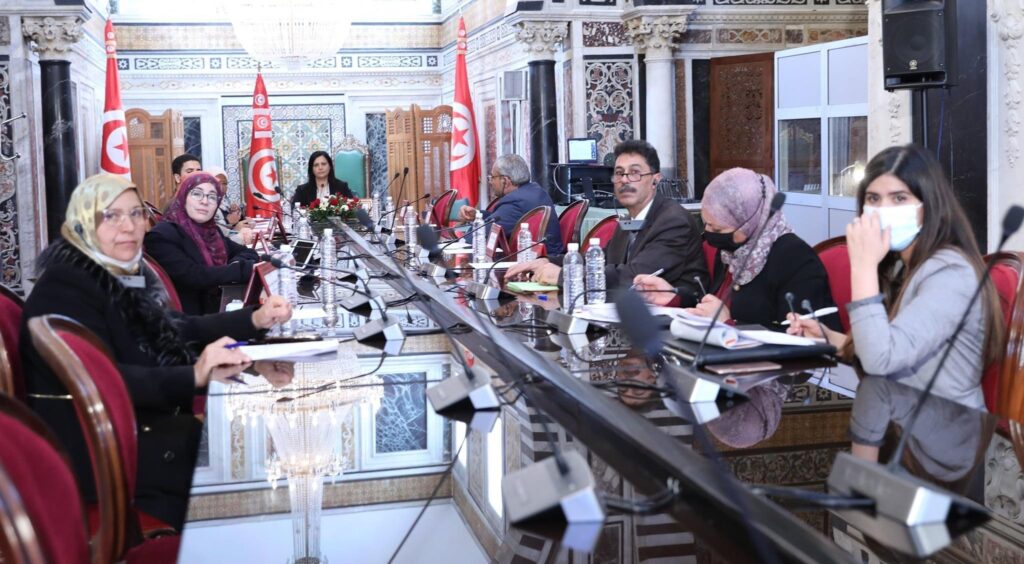On Wednesday, March 24, MPs and officials from the Parliaments of Morocco and Tunisia attended a virtual study tour aimed at sharing best practices in Open Parliament. The event, organized by Directorio Legislativo, Westminster Foundation for Democracy (WFD) and the National Democratic Institute (NDI) within the framework of the Open Parliament e-Network, was also attended by representatives from Chile and Costa Rica. Based on the experiences shared, the aim was to inspire North African legislatures to move forward in the co-creation of their Action Plans.
The pandemic scenario has highlighted the need to continue working for stronger institutions, on the understanding that transparency in decision making can help legislatures to be more resilient in the face of the new challenges the world is facing. Recognizing the need to deepen knowledge about Open Parliament in both countries, the meeting stressed the importance of involving civil society in the process and creating opportunities for joint work in response to citizens’ demands.
Samira Chaouachi, first vice-president of the Tunisian ARP, participated in this peer-to-peer learning event, where she remarked on the relevance of Tunisian civil society, made up of “more than 20,000 associations and organizations active in different areas”. In this regard, she expressed interest in deepening ties with a citizenry that, since the period of the National Constituent Assembly and the drafting of the Constitution, has increasingly consolidated its concern and commitment to public affairs.
Jamila Ksiksi, deputy in charge of relations between the Tunisian Parliament and citizens, stated that measures such as the enactment of the Law on Access to Public Information have strengthened the exercise of participatory democracy, understanding that the co-creation of an Open Parliament Plan will contribute to guide and accompany the path that still lies ahead. In this line, she announced Parliament’s intention to move towards the implementation of programs that, within the framework of the Plan, would promote the digitization of parliamentary archives for easier access to data and the establishment of a multiparty follow-up committee to monitor the progress made in the area of Open Parliament.
On the other hand, Mr. Mohammed Doukha, General Advisor to the Speaker of the House of Representatives of Morocco, stated that the House of Representatives’s adherance to OGP has become at the heart of the Parliament’s action and that the overall aim is to embed democratic practices, dialogue and interaction. In addition, he introduced the Action Plan of the House of Representatives composed of six commitments related to the following themes: Citizen participation; Access to Information and Accountability
Among the main conclusions of the event was that the Open Parliament mechanism builds legitimacy not only in the law-making process, but also in the legislators themselves, who are committed to guaranteeing the implementation of this agenda in order to achieve transformative results. Alejandro Bernales, deputy from Chile, shared the Chilean experience in the creation of the Bicameral Transparency Group: a permanent congressional body whose main objective is to promote actions at the national and international level in the field of open Parliament. Emilie Lemieux, Deputy Director, Open Parliament and Sustainable Development at ParlAmericas, highlighted the Costa Rican good practices focused on building knowledge of assembly officials, training with civil society and working sessions to co-create initiatives with various stakeholders.
It was noted that both Parliaments have taken positive steps towards the establishment of an Open Parliament Plan to strengthen a more transparent, open and participatory chamber under the guidelines of accountability and affirmative measures that take into account the demands of local civil society. This event was an important step in encouraging legislators to promote the process of co-creation in their countries and inviting them to become referents of the agenda before their Parliaments. After the meeting, the Tunisian Parliament announced that the steering committee is working on a communication strategy for the co-creation process.

